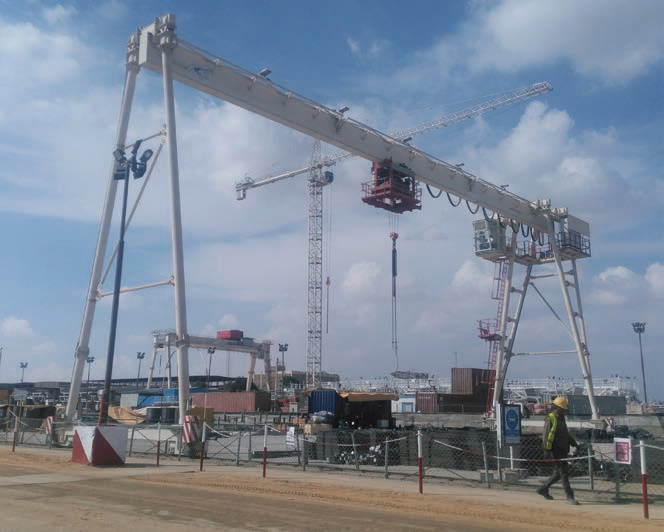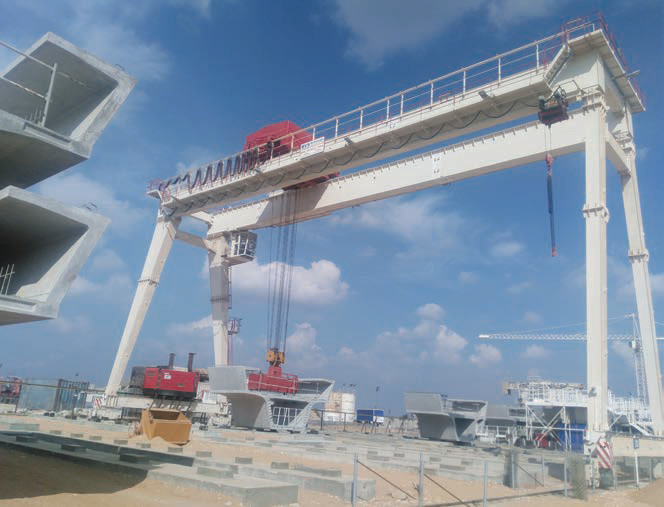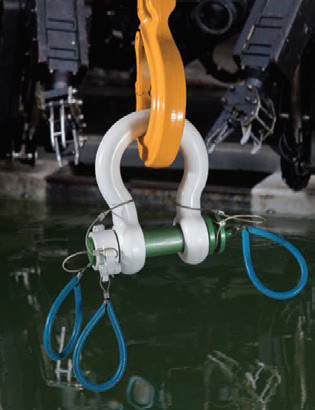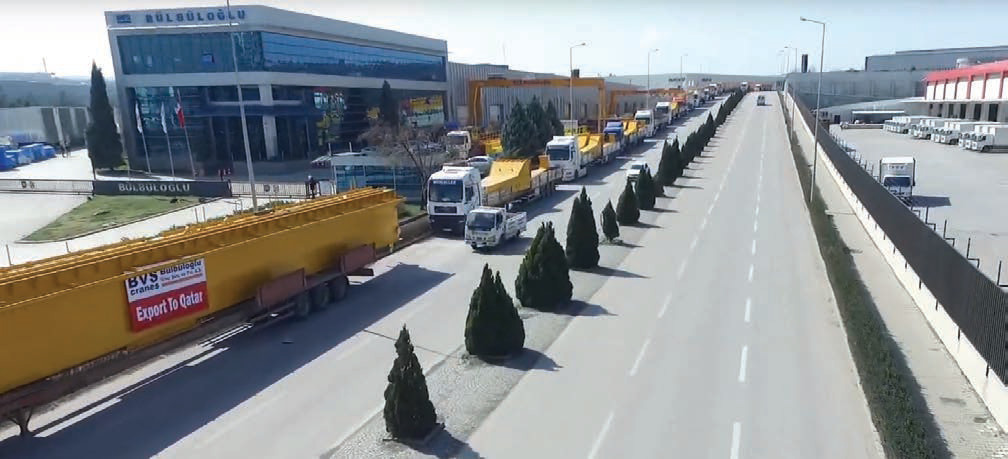Middle east to move
29 July 2019The Middle East is oil-rich but unstable. Julian Champkin finds the market for lifting machinery has been on hold, but is poised to move upwards.
The Middle East is a unique market, for lifting gear as for everything else. It is commonly seen as a single-source economy, and the common view is not far from the truth. Oil and gas extraction overwhelmingly dominates the goods that are in demand there. But it is not a homogeneous region.
Its dozen different countries have different needs, different governments, and different government policies and responses. “Each country is different, especially in the Middle East.” So says Peter Zaremba, Middle East sales director for SWF Krantechnik, who knows the area well. “Different products sell in different countries; you cannot generalise.”
Generalisations should, as he says, be avoided, but one generalisation probably holds true: if you are exporting to the Middle East, the price of oil affects almost everything.
“Oil and gas is the financial driver,” he says, “but not everything relates to oil itself; it is about finance.”
Consider, for example, Saudi Arabia. “Manufacturing is not an important factor there. Oil is important: until three or four years ago the oil industry was our strongest market for hoists and lifting gear. Now it is more spread and diversified. There is infrastructure, and new infrastructure projects. There is work on oil refineries, water plants, railways, subways, bridges, all needing our products. Saudi Arabia has diversified, more than other countries in the region.”
But the diversification is funded by oil: “Saudi needs an oil price of $80–$90 a barrel to have its economy on a stable level,” says Zaremba.
Through 2017 oil averaged $54 per barrel; in 2018 the figure was $71. Current developments in the Straits of Hormuz are causing predictions of a rise.
“Two years ago projects were moving well,” he says. “But now there are huge delays. It can take one or two years for the finance for a major project to be closed. In Saudi, the finance is usually provided by the government. If Saudi starts producing more oil, then there is a chance of change. If they carry on producing the same number of barrels a day, there will be no change.”
Suhan Shetty is Middle East export manager for Street Cranes; he reports similar experiences. “For the past 12–18 months the market has been very slow,” he says. “There were lots of enquiries, and those were strong; they went all the way to the final stage. But at that point, they ground to a halt: none of them materialised. We have not lost ground, but we have not gained it either, and I believe it is the same for other manufacturers. There are still some big enquiries that we are working on, but the key is that the money flow has slowed down.
“There is no investment. Customers have told us that the banks stopped lending back in January—and most lending in Saudi is state guided. Ramadan is traditionally a quiet time; when it ended [on 5th June] people were half-hoping, half-expecting that the market would pick up. Whether it will or not we shall have to wait and see.”
“It is an odd market at the moment,” says Marcus Curry. He is in charge of Middle East marketing for George Taylor Lifting Gear (GT Lifting), which has been trading in the area for 45 years. In 2005 GT set up its own company in the United Arab Emirates as a distribution arm. “It is a market on hold, if you like,” he says. “Everyone is waiting for something to happen. If customers are not sure of the future, and funding is not seen, it becomes a hand-to-mouth existence. So we keep our stocks at a reasonable level, but wait to invest until we see orders and payments. We are standing by for boom and bust but it is suspended animation at present.”
Saudi Arabia may be the biggest country in the region, but it is not the only one. Nevertheless, it is influential. As Curry puts it: “Saudi Arabia has eased back a lot on project spends, which has prompted other countries to do the same.”
“United Arab Emirates [UAE] is an interesting country,” says SWF’s Zaremba. “About 12 years ago American investors saw it as a huge development boom, a fountain for return on investment. It was promoted as a new paradise for tourism, a real hot spot of the world. After a few years they realised that it was only going to be a dream. Europeans cottoned on that it was a fantasy and removed their investments as well. Then it was the turn of Africans to invest.”
UAE is not so reliant on oil, which makes up around 30% of its economy, and more reliant on foreign investment; most of that investment, says Zaremba, has been related to infrastructure projects rather than oil. “That meant there was a need for overhead cranes. Our products have been moving quite well there for the past ten or 12 years, but now the economy has slowed there as well.
“But UAE’s Expo 2020, to be hosted in Dubai, is a big project just now. Most infrastructure development at the moment is related to that. They want to make a big show for the event, so almost everything we sell now ties in with it somehow.”
“Customers in UAE suggest that there are other projects there which may develop,” says Curry. “But we tend to see evidence of such projects six to 12 months ahead, and we are not seeing that; so maybe the projects are still a year or two down the pipeline.”
But there are some other big projects in the region that are needing construction and lifting equipment.
“I was in Kuwait recently,” says Street Crane’s Shetty. “There are massive infrastructure projects there. There is the showcase Palm Island development, there are new roads, and new townships going up. It is not a manufacturing hub; it has its own aluminium plant and a steel plant but there is nothing in sectors like automotive or electrical, and very little in the mid-scale. As far as hoists are concerned, oil, gas, the aluminium plant and small factories are the customers. Most factories, such as they are, are expanding. Big local companies seem not to be affected by the lending freeze. After Ramadan last year in 2018 it was expected that banks would start giving loans. It didn’t happen.
“But it does seem that things are picking up now. People are calling to say ‘Let’s finalise this.’ There is a gut feeling of ‘Let’s get ready.’ Everyone I talk to says that it is going to pick up.
“So this month we got some good orders. We have a big dealer in Oman who seemed to be struggling. But a big order from them has just emerged, and there may be two more in the coming two months. A big bus factory is coming up, for which we are bidding. The Alba aluminium plant in Bahrain is just opening a new sixth line, which will make it the largest in the world. It seems investment is starting again. I am quite hopeful for the next quarter. People are optimistic.”
“There are still some big projects,” says Curry. “Qatar Stadium, being built for the 2022 World Cup, is still a busy market, no question. Kuwait is big. Egypt has been growing steadily over the past 18 months, from central bank lending. It has a surprisingly big oil and gas market, which is not always appreciated. Bahrain has evidence of gas investment: there will be good business going into that country over the next five years.”
And moving away from the perhapstemporary stagnation of Saudi, BVS Cranes of Turkey has been finding ready markets, with enquires and firm orders. “The Middle East is generally a booming area for the crane industry, especially for the last few years,” says Buket Aybasti, chief of foreign sales. “There are several investments in construction, energy, port and other industries; and for all these industries there are lifting requirements.”
Ports in particular, she says, are seeing increased business: “The demand for port cranes has increased perceptibly. For example, we are getting inquiries for shiploaders—we specialise in these— rubber tyred gantries, rail mounted gantries and ship-to-shore gantry cranes.
“By the location of our country we are a neighbour to Middle East countries, and they like to do business with Turkish partners.”
“Among the other Gulf states, Oman is very small and its government makes no infrastructure investment,” says Zaremba; “We sell there through UAE, and it is almost all equipment for the oil industry. Bahrain is also small, but for the past three years we have been selling well there. Although it is a small economy we have been sold a 30t hoist for the power generating station, and 5t hoists for sub-stations.
“Egypt has had quite a good two or three years,” he says. “Most products, say 80% of them, are related to infrastructure or the military.”
BVS has designed and manufactured three double girder gantry cranes and a single girder gantry crane for the Cairo Metro Line together with launching girders and winches, says Aybasti, and is continuing its involvement with phase 4 of the project.
A new phenomenon has appeared in the region, says Zaremba: payment delays. “It used to be that 50% was paid in advance as standard. Now advance payments are zero or very small. It is becoming a huge issue: the whole region has the problem.”
Curry of GT Lifting reports the same phenomenon: “We sell through distributors, not directly to the end user. In the heady days of 2015 and 2016 all was very good. Then payment became a big issue, with our distributors blaming late-paying oil customers to whom they in turn were selling on. That restricted the scope of the market. If you don’t get paid for a year you ease back. That affected our strategy and investment in the area. There were jobs available that we could bid for, but if you are going to have problems getting paid for them…
“I cannot say that it was the oil companies being slow; it may have been the middle men delaying. But certainly there was a lack of cash flow in the market. We used not to see that.”
And of course politically the region is not as stable as one could wish—though some incidental advantages accrue. “The dispute between Saudi Arabia and Qatar has affected us,” says Curry. “Many of our Dubai customers sent huge shipments to Qatar for the 2022 World Cup. That has just stalled. We now trade with Qatar directly, from the UK—which is good for us in the UK. Sending direct means there is a clear path, with no issues and gives no headaches. Doing it via UAE was far more problematic.”
“We are not selling to Iran because of sanctions,” says SWF’s Zareba. “Iraq is open for business but is too unstable a place to risk our business.”
“The split of business has changed hugely in the past ten years,” says Curry. “Price pressure is now king. Dealers—not necessarily end customers but certainly dealers—are going for the most economic product, not necessarily European but third world and Asian manufactured. Again this is quite a challenge. It is the choice of the middle band of dealers who are fighting each other desperately over price.
“Premium standard is no longer the default option. It is less true for oil, but certainly seems to be the case in construction. The reasoning at the user end seems to be: ‘We are using unskilled labour, so less-than-premium equipment will be OK for them.’
“We have seen many occasions where our pitch was suddenly rejected; by the same token there have been times when we have gained orders after the substituted, sub-standard, product went wrong.
“Of course no procurement official is going to say ‘We made a mistake buying the cheaper version’ but you see the evidence in tenders that are re-floated a few months or a year after the original one.
“It makes for a situation which is much more challenging for us. We used to do everything through our dealers; we now seek much more interaction ourselves with the end user, to be sure they know what they are going to get. It is the difference between Waterford crystal cut-glass and a product from IKEA. There is a place for both but there are times when you need the better one.”
For the future, Shetty sees potential: “I am quite hopeful for the next quarter in the general trend. People are optimistic.”
Zaremba takes a longer view, with more caveats. “I am not very optimistic,” he says. “Oil is one thing but it is not only about oil. A lot in the background needs to change. The internal politics, the external politics, the way that governments plan for education, and so on: all of that is dependant on oil. There is little other industry; so much needs to happen for a diverse and stable economy.”



